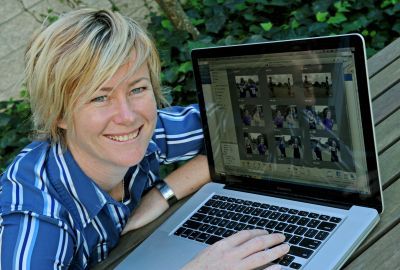Isolated Australia at forefront of social networking craze

From the moment she wakes in inner-west Sydney, Danielle Warby is online.
She checks Facebook, she reads Twitter. She blogs and Tweets during the day, in spare moments between her marketing job at Sydney University. Later, she'll submit real-time restaurant reviews as she eats her dinner.
"My smartphone changed my life. Serious. It has my calendar, all my contacts and is an easy and intuitive communication tool," Warby, 34, told AFP.
Warby is not alone. According to Nielsen research, Australia's Web users are at the forefront of the social networking craze, posting, poking and Twittering nearly seven hours a month - more than the United States, Britain or Japan.
The figure may not seem high but it is an average taken from Australia's entire web-using population, including those who do not use the social networking sites at all.
It compares with a global average of five-and-a-half hours, making Australians the "world's most prolific users of social media", according to Nielsen.
The study found the social sites, whose use exploded 82 percent worldwide last year, were used by an estimated 9.9 million of Australia's 22 million population.
The findings jar with Australia's reputation as more beach resort than tech haven. But an estimated 80 percent of Australians now have access to high-speed broadband and use the internet, again more than the United States.
According to experts, this embracing of the new technology reflects the desire of mainly young Australians to bridge the country's global and internal isolation and make their voices heard.
"Distance is a tyranny in this country," said Mike Minehan, a communications lecturer from the University of Technology Sydney's Insearch college.
"There's a subconscious drive in Australia to step outside this isolation we find ourselves in. I think that's what's driving it here, the desire to be part of the world and not to be an insignificant island nation in the southern hemisphere."
Australians have taken to Facebook, the world's top social networking site in December, in droves, accounting for 8.2 million of its 206.9 million visitors that month.
As a well-travelled, multicultural society, Minehan said Australians used social media to connect with friends and family overseas, and also to shape a sense of national identity.
"We're really an Asia-Pacific nation with a European heritage, recognising that this is an anachronism," Minehan said.
"I think that the social networking sites and the high use of them represent Gen Y's search for more meaningful connectivity and identity other than the old cliches of the blond surf lifesaver, the Opera House and Aboriginal identity."
Social media commentator and researcher Laurel Papworth said the personality-based sites were a "natural fit" for well-educated, curious and outspoken Australians.
"We are less politically correct than the US, so are more likely to have an engaging, authentic, almost naughty or cheeky style that others like to read. We're not afraid of making a joke at our own expense," she told AFP.
Papworth added that older users were also increasing exponentially as they sought to stay in touch with their grandchildren.
One in five Australians aged 55 or older had reported using Facebook, with the site claiming seven million users of all ages nationwide, a "not insignificant" portion of the population, she said.
"People in Outback towns may well use social networks to connect to children who have migrated to large cities," Papworth said.
It's a trend that looks set to continue, with the government already setting in motion ambitious plans to wire up 90 percent of the sprawling country's homes with high-speed broadband by 2017.
Prime Minister Kevin Rudd and his conservative challenger, Tony Abbott, have both capitalised by Tweeting and Facebooking regularly, and experts expect social media to play an important role in this year's election.
"I do think we are are likely to see some exciting, explosive (election) moments courtesy of Twitter and as a public we need to applaud that," said University of Canberra academic Julie Posetti.
"A bit of honesty and authenticity back in politics is something I am sure a lot of people would welcome," she said.
Warby said social media had not only improved her connections with friends, but had also expanded her professional horizons, with unsolicited job offers flowing from her online profile.
"Social media just amplifies word of mouth, but times one million," Warby said, denying the new technology was dominating her life.
"I don't find it intrusive at all," she said. "I turn it off when I need to."
Join our commenting forum
Join thought-provoking conversations, follow other Independent readers and see their replies
Comments
Bookmark popover
Removed from bookmarks